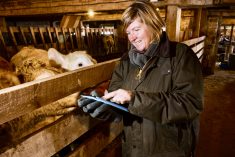It’s less true than it used to be but it’s still safe to say that few of today’s farmers got into farming because they love business management. Instead, it’s the production side of agriculture that drew them in. It was their passion for growing and raising food and working with soil, livestock and equipment.
Still, no matter where you find yourself on that continuum, you can’t farm in Canada in the 2020s if you aren’t at least an effective and knowledgeable farm manager.
But what if you knew you could boost your farm’s performance by finding some extra hours to pump into managing the business — which you’d be more likely to do if only it turned your crank a bit more — or if you felt more capable of tackling it?
Read Also

‘No agenda, no attenda’: How to professionalize your family farm meetings
Establishing meeting ground rules can help a farm family find ways to communicate that work for the business and the family.
Well, you aren’t alone.
The greatest challenge for the greatest number of Canadian farmers today is the discipline it takes to put more effort into management.
- RELATED: The greatest challenge for this farm operation
- RELATED: Eight steps to great farm management
This sounds brutal, but it’s said more and more often. Farm succession advisor Len Davies, for instance, says the sophistication gap between farms is already big and it’s growing fast.

Larry Martin, principal with Agri-Food Management Excellence, agrees. And he has advice on what to do about it. Farmers don’t have a choice whether they excel at managing their business, Martin says. “You just have to do it.”
Admittedly, it takes a lot of doing. Running a farm business is increasingly complex but there’s little chance you can design your farm so it doesn’t need that kind of effort, Martin says. “No matter the size or structure, most farms require the same set of management responsibilities, they may just look different at different sizes.”
Skills for success
“A successful farm manager should be forward thinking and not afraid of dealing with the details and paperwork required to operate a farm today,” says Coralee Foster, partner with BDO at Mitchell, Ont. “Most importantly, the person, or group of people responsible for the farm management should value what the role brings to the farm. There’s tremendous value in managing versus ‘doing’ on the farm.”
The role also requires a good understanding of farm financials as well as communication skills, leadership, problem solving, strategic thinking and organizational skills.
The good news is that most of those skills can be developed, delegated or ‘farmed out’ to a professional advisor or consultant if needed.
Foster notes that the complexity of managing farms today continues to increase as new regulations are imposed and she expects we will see an increase in reporting and paperwork for farms, including on human resources and environmental and social governance.
The right attitude is also important, Foster says. “The reality is that every farm owner or designated manager is doing some level of management, but not everyone recognizes the value of what’s needed to be successful or to move the farm to the next level.”
Get serious — how much time?
Martin understands the time constraints farm managers face but he recommends farm managers schedule a half day a week at a minimum for management responsibilities. These tasks should include planning, reviewing financials, performance assessments, marketing and human resources.
“And if you can’t do it, delegate it to someone,” advises Martin.
For anyone unsure if they need to outsource or seek help with management responsibilities, Martin suggests they take an honest look at the business. For example, if there’s a plan with clear objectives, but the farm is consistently failing to meet those target objectives, it might be time to consult an outside advisor. Or, if there’s an existing process that’s not serving the business, Martin suggests finding a professional who can help identify the problem.
At Farm Management Canada, executive director Heather Watson says most farm managers today are responsible for managing family businesses, which involves family dynamics where roles, responsibilities and accountabilities aren’t often as clearly defined or followed as in non-farming businesses where organizational charts and policies would typically guide and govern an employee team.
Watson also points out that most farm managers operate with a relatively small team where everyone, including themselves, must wear many hats. But it’s still clear, she says. “A successful farm manager needs to be able to hold the big picture of their goal or plan while focusing on the everyday details.”
Martin agrees. “Your farm’s success depends on how you manage it,” he says. “Even if you don’t enjoy it, you have to figure it out anyway.”
Studies show farm management practices pay off
A recent Farm Management Canada study confirms farmers who routinely follow farm business management practices (i.e. they plan ahead, monitor and measure performance, and seek knowledge and skills development) are both more profitable (sometimes much more profitable) and also more confident.

Heather Watson, FMC executive director, also points out that by staying on top of farm management activities, they are also better prepared to confront change with confidence and to pivot the business to mitigate risk and seize new opportunities.
“We also found 83 per cent of Canadian farmers recognize the benefits of investing in farm management activities and would like to spend more time on their farm business practices,” says Watson. “But those same respondents said they are struggling to find time to focus on the business side of the farm, they have a hard time implementing management methods, and they find it difficult to get others on board with adopting more formal businesses practices.”
Farm it out?
Should they consider turning some of those jobs over to someone who can? Watson’s view is clear: “If you’re not taking care of the business side of farming, you can’t afford not to hire a farm manager.”
BDO’s Coralee Foster says that, depending on the task required, it could lead to strategies as easy as hiring a part-time bookkeeper or a human resources consultant.
But that doesn’t mean the job is completely off your shoulders. Like it or not, the boss is still responsible for co-ordinating the work and for making sure nothing falls through the cracks.
Recommends Foster: “Have advisors talk to each other, establish annual meetings with your team and host quarterly meetings with family and staff to engage everyone to share your plans and assess performance.”
As Watson reminds farmers, “we are all at our best and do our best when we’re doing the things we love, like farming. But some things have to get done, whether you like it or not, and if business management isn’t your jam, then find a way to get help.”
















